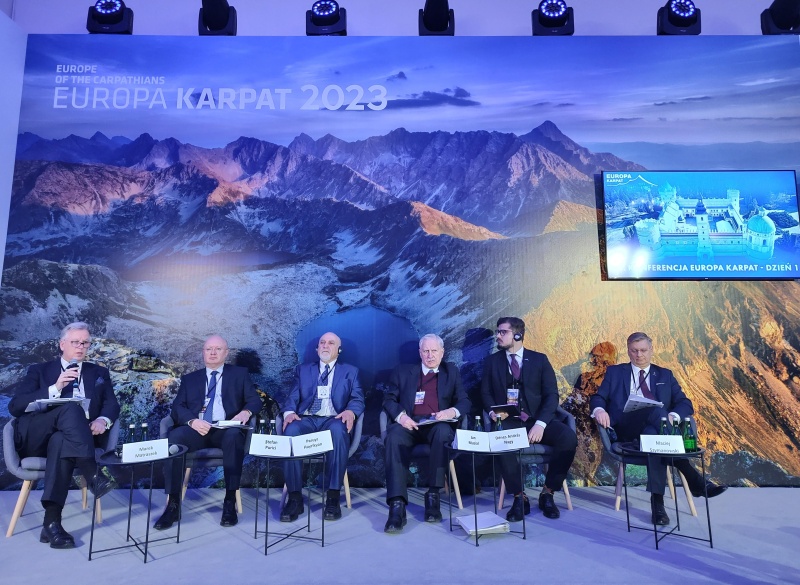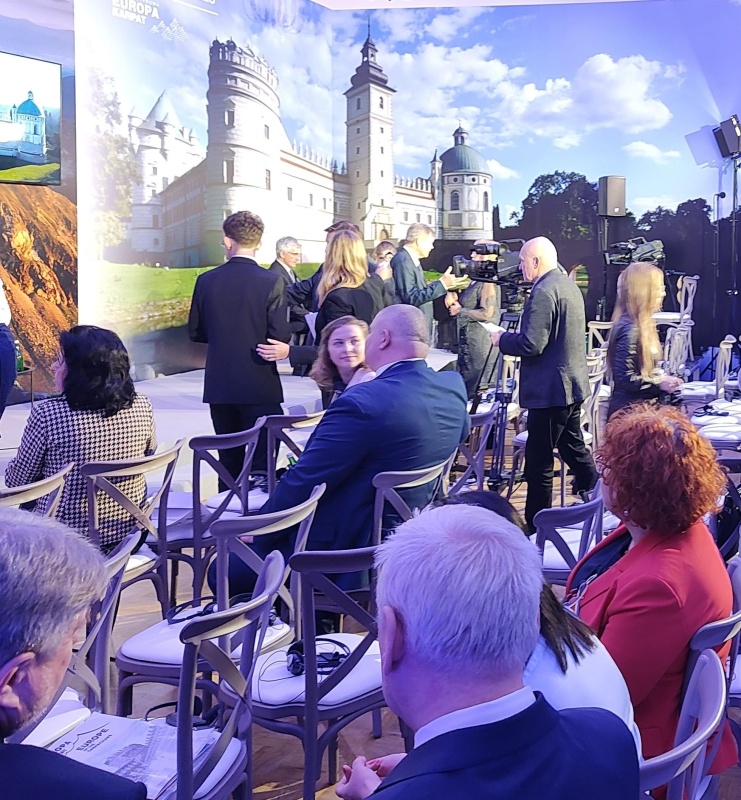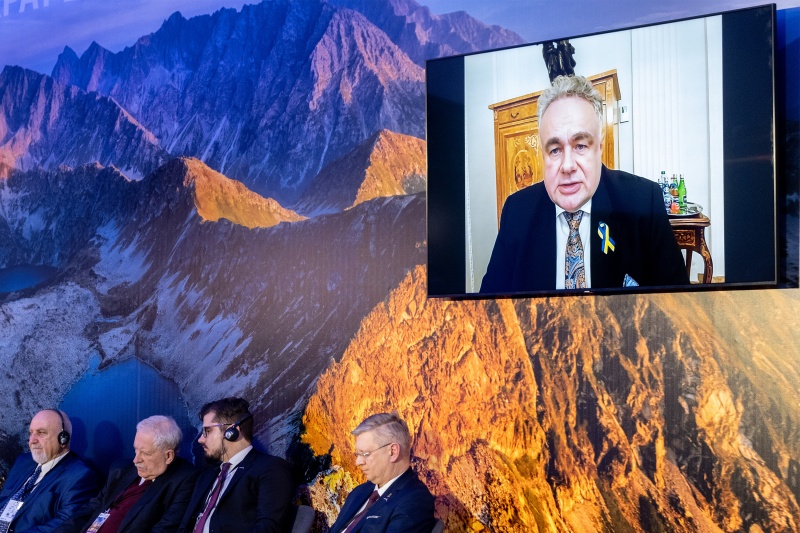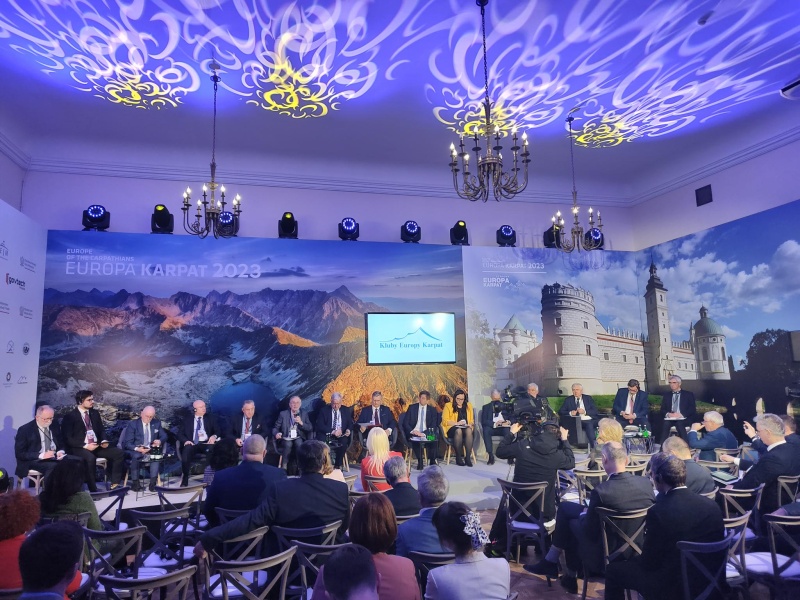- Next year we will celebrate the 35th anniversary of the great revolutions in Eastern Europe in 1989, which in various ways led to regaining freedom and independence. Not only Francis Fukuyama, but most of the participants in those events believed that freedom, once obtained, is given to us once and for all (...) Today, we no longer live in such optimistic times - noted Marek Matraszek from the Roger Scruton Heritage Foundation, drawing attention to increasing threats to freedom.
 Fot. JAP
Fot. JAP
- The most important threat to the freedom not only of Ukrainians, but also of other countries of Central and Eastern Europe is Russian imperialism and the wars it has caused - stressed Marek Matraszek. - It is no coincidence that President Joe Biden spoke with the leaders of the nine countries in Bucharest about how we can protect the freedom of the West, he added.
Romanians support the freedom of Ukraine
In February and March of 2022, Romania showed how important freedom is. Although many believed that Romanian-Ukrainian relations were not very good, Romania opened its doors and hearts to people seeking refuge from Russian aggression, noted the Vice-Rector for International Relations at Stefan cel Mare University in Suceava, Ştefan Purici. He added that Romania then welcomed as many as three million Ukrainian refugees, even though it was not yet known whether Romania might be the next target of Russian aggression. "According to the latest surveys, 62 percent of Romanians still support Ukrainians and their fight for independence," emphasized Vice-Rector Purici.
The biggest mistake of Western civilization
- I have been closely following what is happening in Ukraine since they are fighting for us," announced Paruyr Hayrikyan from the Union for National Self-Determination of Armenia, who, as a student, published a newspaper with his colleagues under the slogan "Freedom or Death" and, as a 23-year-old, was a political prisoner. The biggest mistake of our civilization is the belief that each nation can have its own kind of democracy. Such beliefs lead directly to various types of dictatorship. There is only one kind of democracy, which is the right of every human being to participate in governance on equal terms," emphasized Paruyr Hayrikyan, noting that "the revolutions of 1989 were the result of the cooperation of the entire democratic world."
During the discussion, Jan Musiał, the president of the Przemyśl Cultural Society, recalled the greatest heroes fighting for freedom, such as János Esterházy, Ryszard Siwiec, and Jan Palach, who paid for their fight for freedom against the communist machine of oppression with their lives.

Fot. JAP
The Importance of Unity in Central Europe
- One of the greatest freedoms is that today we can freely speak in our own languages in our own countries, although our ancestors lived for many hundreds of years under occupation. At that time, the use of our national language was not allowed - emphasized Dénes András Nagy, a member of the Program Council of the Carpathian Europe Clubs. A young Hungarian, born after the pro-democratic revolutions in Central and Eastern Europe, noted that for him and his generation, "1989 is already a written history." "It is an important date for us because we, the young people, feel that it was then that the opportunity arose to decide which world we wanted to belong to. We, the nations of Central Europe, decided in 2004 that we wanted to join the European Union," Dénes András Nagy recalled, pointing out that Hungarians had never left Europe, although attempts had been made to separate them from it. "For my generation, the huge disappointment is what has happened since 2004 and the way the European Union has changed," noted the member of the Program Council of the Carpathian Europe Clubs. He also mentioned the results of a Eurostat survey among young people. "In 27 member states, only 28% of young Europeans felt satisfied with the current way the European Union is working," Dénes András Nagy stated. He also noticed that the greatest threat to Central Europe is "allowing ourselves to be divided." "From the point of view of our freedom, it is crucial to maintain the most important value, which is unity," concluded the young member of the Program Council of the Carpathian Europe Clubs, drawing attention to external forces that are interested in breaking the unity of the Visegrad Group countries.

Fot. Piotr Tracz/Kancelaria Sejmu
Maciej Szymanowski, Director of the Institute of Polish-Hungarian Cooperation, highlights the significant progress made by Poland, Hungary, the Czech Republic, Slovakia, and Romania in terms of political freedom and civil liberties. He notes that these countries now have free and fair elections, term limits, religious freedom, freedom of speech, and freedom of assembly. He also emphasizes the high level of mutual trust that has developed among these nations, although there is still room for improvement in their relationships.
Szymanowski credits this progress to the experiences of totalitarianism that the people of this region have endured, which have made them wary of any attempts to engineer their societies. He also notes that these nations have developed the ability to say "no" as sovereign states.
However, Szymanowski also identifies two major threats to freedom in the region: Russian imperialism and debt. He calls for continued vigilance and cooperation among the countries of Central and Eastern Europe to maintain the gains they have made and address these challenges.

Fot. JAP
(JAP)
